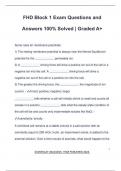Exam (elaborations)
FHD Block 1 Exam Questions and Answers 100% Solved | Graded A+
- Course
- Institution
FHD Block 1 Exam Questions and Answers 100% Solved | Graded A+ Some rules for membrane potentials: 1) The resting membrane potential is always near the Nernst Equilibrium potential for the ____________ permeable ion. 2) A ____________ driving force will drive a positive ion out of the cell or ...
[Show more]



